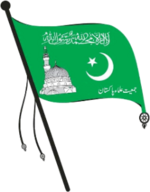Jamiat Ulema-e-Pakistan (JUP) (Urdu: جميعت علماءِ پاکستان) is an Islamist political party in Pakistan. It was founded in 1948 by leaders of All India Sunni Conference. The JUP exercised considerable political influence in Pakistani politics during the 1970s to 2003. Its students' wing Anjuman Talaba-e-Islam has a following in Sunni institutions across the country.[5] The party is considered a moderate force in the country.[6][better source needed]
Jamiat Ulema-e-Pakistan (JUP) جميعت علماءِ پاکستان | |
|---|---|
 | |
| Abbreviation | JUP |
| President | Pir Ijaz Hashmi[1][2][3] (JUP-IN) Sahibzada Abul Khair Muhammad Zubair[1] (JUP-N) |
| Chairman | Shah Anas Noorani (JUP-IN) |
| General Secretary | Shah Owais Noorani[3][2] (JUP-IN) |
| Historical leaders | |
| Founders | Maulana Abdul Ghafoor Hazarvi[2] Hasanaat Sayyed Qadri[2] |
| Founded | 28 March 1948 |
| Student wing | Anjuman Talaba-e-Islam |
| Religion | Sunni Islam specifically, Barelvi[2] |
| National affiliation | Pakistan Democratic Movement (JUP-IN) Muttahida Majlis-e-Amal (JUP-IN) |
| Colors | Green |
| Factions | Jamiat Ulema-e-Pakistan - Imam Noorani (JUP-IN) Jamiat Ulema-e-Pakistan - Noorani (JUP-N) |
| Senate | 0 / 100 |
| National Assembly | 0 / 366 |
| Election symbol | |
| Key[4] (JUP-N) Chitrali cap[4] (JUP-IN) | |
Although, there are many of the small factions of JUP but the two larger factions are currently headed by Shah Owais Noorani, son of former JUP leader late Shah Ahmed Noorani, and the other by Sahibzada Abul Khair Muhammad Zubair namely Jamiat Ulema-e-Pakistan (Imam Noorani) and Jamiat Ulema-e-Pakistan (Noorani) respectively.[1] | |
History
editIt was established on 28 March 1948 in Multan by the leaders of All India Sunni Conference to present Sunni Sufi representation in the Islamic Republic of Pakistan. It had a major support base in Sindh and Punjab.[7]
JUP supported Ayub Khan's regime during the 1965 presidential elections on the promises of getting a Shariah-based Pakistan.[8]
In the 1970 elections, the JUP won seven seats in Sindh [9] under the leadership of Maulana Ahmad Shah Noorani; the party did not join General Zia Ul Haq government due to Salafi-Saudi inclination of the Zia regime. The party was opposed to Zia's military rule for two reasons. First was its pro-democracy stand and second because of Zia's support of Deobandi-Wahhabi Islam promoted by Saudi Arabia.[10]
Ideology
editJUP was established for the implementation of the Quran and Sunnah in the newly formed Islamic Republic of Pakistan. The party advocated the establishment of Islamic system of Prophet's Sunnah (Nizam-e-Mustafa) Shariat Courts and passing of law of blasphemy and played a role in declaring Ahmadis as non-Muslims. In 1974 a bill was passed in the parliament to declare Ahmadis as non-Muslims through the efforts of JUP President Shah Ahmad Noorani.[8] JUP through its leaders inserted the definition of Muslim and argued that the Finality of Prophethood to be included in this definition.[11]
It opposed to the US-led attack in Afghanistan after 9/11 but supported combating the Taliban and hardcore extremist ideologies in the Swat region of Pakistan.[6]
Present
editThe party was mostly active from 1970s to 2003 as independent political party and having a role in mainstream politics and significance as well. Clashes over party decisions have divided the JUP into factions, and since 1986 the JUP has lost much of its support. The two main factions are headed by Shah Ahmad Noorani and Abdus Sattar Niazi.[5] After the death of Noorani, one faction is led by Shah Owais Noorani, son of former president late Shah Ahmed Noorani, and the other by Sahibzada Abul Khair Muhammad Zubair, a former MNA of Hyderabad.[12][8]
On 20 September 2020, JUP founded Pakistan Democratic Movement along with ten other parties. On 20 September 2020, JAH's Ameer Sajid Mir attended the All Parties Conference (APC). At the APC, eleven parties started the Pakistan Democratic Movement (PDM) which was made to remove military establishment of Pakistan from politics. JUP also came for PDM's public gatherings and power-shows.[13]
Factions
editCurrently the party has split into multiple successor and breakaway factions:
References
edit- ^ a b c "List of Enlisted Political Parties" (PDF). Election Commission of Pakistan. 3 March 2022. Archived from the original (PDF) on 8 March 2023. Retrieved 23 March 2022.
- ^ a b c d e "Awais Noorani slams JI politics". The Nation (newspaper). 24 October 2017. Retrieved 1 September 2021.
- ^ a b "JUP to launch Shariah movement". The News International. 31 March 2019. Retrieved 31 May 2021.
- ^ a b "116 Election Symbols to political parties" (PDF). Election Commission of Pakistan. Archived from the original (PDF) on 24 April 2021. Retrieved 23 March 2022.
- ^ a b "Jamiatul Ulama-i Pakistan - Oxford Islamic Studies Online". Archived from the original on 14 April 2021.
- ^ a b "Jamiat Ulema-e-Pakistan (JUP) | Terrorist Groups | TRAC".
- ^ Hussain, Mazher; Rizvi, Shahid Hassan; Ahmad, Mian Saeed; Gillani, Aftab Hussain; Gillani, Azra Nasreen; Mphil, Almas Fatima (2016). "Religio-political Discourse and Jam'iyyat Ulema-i-Pakistan (JUP): A Careful Study of Different Narratives (1970–2003)". International Journal of Social Science Studies. 4 (6): 24–36. doi:10.11114/ijsss.v4i6.1457.
- ^ a b c "The Role of Islamic Parties in Pakistani Politics".
- ^ Dieter Nohlen, Florian Grotz & Christof Hartmann (2001) Elections in Asia: A data handbook, Volume I, p686 ISBN 0-19-924958-X
- ^ Hussain, Mazher; Rizvi, Shahid Hassan; Ahmad, Mian Saeed; Gillani, Aftab Hussain; Gillani, Azra Nasreen; Fatima, Almas (April 2016). "Religio-political Discourse and Jam'iyyat Ulema-i-Pakistan (JUP): A Careful Study of Different Narratives (1970-2003)". International Journal of Social Science Studies. 4 (6). doi:10.11114/ijsss.v4i6.1457. Retrieved 8 June 2021.
- ^ "Jamiaat-e-Ulamma-Pakistan [JUP] Jamiat Ulema-e-Pakistan [JUP] Jamiat Ulema-i-Pakistan, Niazi faction (JUP/NI) Jamiat Ulema-i-Pakistan, Noorani faction (JUP/NO)". www.globalsecurity.org.
- ^ Khan, Mohammad Hussain (17 February 2014). "Noorani's JUP splits into two factions". DAWN.COM. Retrieved 9 May 2021.
- ^ Fair, C. Christine (2004). Islam and Politics in Pakistan. RAND Corporation. pp. 247–296. ISBN 9780833035349. JSTOR 10.7249/mg246af.15. Retrieved 9 April 2021.